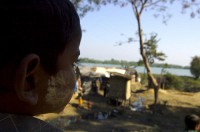
By Alex Hart, Indiana University ’15
The Rohingya are a stateless ethnic group living on the west coast of Burma and east Bangladesh. They are described by the United Nations as one of the world’s most persecuted and unwanted peoples, for the Rohingya have been denied citizenship and other rights by both Burma and Bangladesh for decades. Last June, tensions boiled over between the mostly Muslim Rohingya and mostly Buddhist Rakhine in Burma’s Rakhine State. The violence continues to this day. Over 110,000 people have been displaced, thousands of homes destroyed, and hundreds killed.
Who are the Rohingya and where are they from?
There are an estimated 1.4 million Rohingya people in the world today, a majority of whom live in Burma, with other large populations in Bangladesh and Pakistan. Formerly known as the Arakanese, the Rohingya have lived in what is now Rakhine State for over 500 years. The Rohingya, formerly a separate, self-governing group, were conquered by the Burmese in the 1780s, then ruled as a colony by the British, occupied by the Japanese during World War II, and finally ruled by Burma’s military junta.
What sorts of abuse are being committed against the Rohingya?
The Rohingyas’ very existence is currently subject to great controversy within Burma and Bangladesh. The Myanmar government believes the Rohingya are illegal migrants and refers to them only as “Bengalis”. The 1982 Citizenship Law was a measure passed during Burma’s military dictatorship and denies Rohingya citizenship on the basis that they are foreigners, despite many having lived in Burma for generations. Bangladesh reluctantly allows Rohingya to live in camps near the border with Burma, but denies them any government help. There have also been reports of Bangladeshi authorities turning back boats carrying Rohingya fleeing recent violence in Rakhine State.
In addition to being denied citizenship, the Rohingya are not allowed to travel or marry without permission, and are forbidden to own land or have more than two children by the Myanmar government. They are frequently subjected to land confiscations, arbitrary taxes, forced evictions, and police brutality. It is also common for the Rohingya, as well as other minority ethnic groups in Burma, to be used as forced laborers as porters of the military or construction workers. They are denied access to public resources in both Burma and Bangladesh, including schooling and medical attention, because they are not considered citizens of either country. Both the Myanmar and Bangladeshi governments have prohibited humanitarian organizations from specifically helping the Rohingya in areas of conflict, adding to the already dire need of the Rohingya.
What caused the ongoing conflict in Rakhine State?
On May 28, 2012 a group of men robbed, raped, and murdered Ma Thida Htwe, a Rakhine woman. Eventually, three Rohingya men were arrested and sentenced to death for her murder. The image of Ma Thida Htwe’s mutilated body spread on the Internet, exacerbating the already tense relationship between the Rohingya and Rakhine. In June, violent protests erupted throughout northern Rakhine State, and on June 10 the Myanmar security forces declared a state of emergency and were authorized to use deadly force to quell the demonstrations. Both the Rohingya and Rakhine contributed to the violence that erupted. However, Rohingya shops and homes were frequently targeted by authorities and burnt down, causing mass displacement. Violence again erupted in late October and sporadic but ongoing violence and abuse continues today. Since June, Bangladeshi authorities have been accused of turning away just under 2,000 Rohingya refugees fleeing to the safer, but not necessarily freer, Bangladesh.
Is this genocide?
As of this writing, the international community has expressed criticisms of Myanmar President Thein Sein’s handling of the ongoing conflict in Rakhine State. However, this criticism has often been accompanied by praise of the country’s recent democratic reforms, sending mixed messages to the Myanmar government. The Saudi government has voiced perhaps the harshest condemnation of the Myanmar government in what it calls an “ethnic cleansing campaign” against the Rohingya. Nonetheless, the conflict has the alarming potential to become increasingly violent and devastating to the region due to its deeply rooted ethnic and racial tensions. It is up to the international community and human rights organizations, like STAND, to continue to monitor the situation in Burma for not only the sake and well being of the Rohingya, but all of those in harms way.
